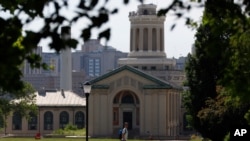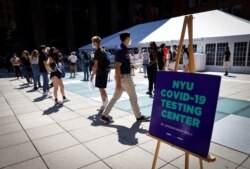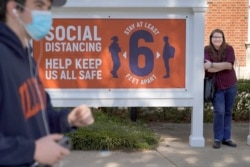Student Union
More Universities to Close After Thanksgiving

As COVID-19 cases surge around the U.S., more universities and colleges plan to move all classes online after Thanksgiving break in late November, while others say they will allow students to return to campus.
The University of Pennsylvania, University of Arizona, University of California in Los Angeles and Berkeley, Syracuse University in New York, and the University of Michigan are among the increasing number of schools ending all in-person classes for the semester after Thanksgiving.
The University of Arizona will, too, switch to remote learning over the break, and like the University of California and many other schools, will make the dorms available for the remainder of the semester for those who don’t have alternate housing.
“It is such a major operation, safely, to get all the students back to campus, that you really cannot manage that more than twice a year,” explained Frederick M. Lawrence, former president of Brandeis University in Massachusetts and chief executive officer of the Phi Beta Kappa Society in Washington.
“You bring them on board, [and] you keep them as safe as you can during the time they're there,” said Lawrence. “You send them all home [for holidays] … but then they stay home.”
In a non-pandemic year, students usually join their families for Thanksgiving, a harvest celebration involving a lot of food and televised college football games. Students typically return to campus for about a month until late December, when the semester ends for winter break. After three to four weeks of winter break, that include the Christmas and New Year’s holidays, students return to campus for the start of new classes in January.
But the pandemic has upended a campus calendar that has carried on for decades. Millions of students are normally on the move over Thanksgiving and the winter holidays, the most traveled U.S. holidays of the year, reported the U.S. Bureau of Transportation Statistics.
Because cases of COVID-19 are reaching record highs, schools are trying to mitigate the impact students might have on spreading the virus.
Most State University of New York (SUNY) schools will require students to submit a negative COVID-19 test before heading home for Thanksgiving. SUNY, with 415,572 students, is spread among 64 campuses around the state that hosts the second-largest population of international students, nearly 125,000. (New York University in New York City is the No. 1 destination for foreign students.)
"By requiring all students to test negative before leaving, we are implementing a smart, sensible policy that protects students' families and hometown communities and drastically reduces the chances of COVID-19 community spread," said SUNY Chancellor Jim Malatras in a press release.
Indiana University (IU) will require its 48,514 students to have exit testing as they head home for the Thanksgiving break. Last week (November 11), some IU students were suspended for celebrating in the streets after a football win. The week before, the university shut down its Delta Upsilon fraternity house through summer 2021, for hosting a large, unmasked Halloween party.
“Students will leave a state with skyrocketing new COVID-19 cases and some might sit next to grandparents a few days later,” tweeted Matt Cohen, enterprise reporter for the Indiana Daily Student news outlet.
The University of Missouri, another large Midwestern state university, changed its plan last week to online learning for its 29,843 students. The decision, announced November 12, came after a surge in COVID-19 cases in Missouri, according to University of Missouri System President Mun Y. Choi.
Until the surge, Missouri considered limited internet access at home, finances, and their COVID-19 case count when deciding to keep the campus open after the break, said University of Missouri Spokesperson Christian Basi.
“We have many students who rely on on-campus work to provide them with a source of income and if we were to close the campus not only would many of the students not be able to return, but there are some of those jobs that simply would stop,” said Basi.
“We have been managing the pandemic here on campus extremely well. Our active caseload has fallen about 90% since it peaked over the Labor Day weekend” in September, said Basi.
The University of Maryland (UMD), which had planned to bring students back after the break, also retracted their decision last week and will be completely online after Thanksgiving for its 40,521 students, according to an email sent by UMD President Darryll Pines to students.
UMD and the University of Wisconsin are among other schools that have told students who travel for the break that they will not be allowed to return to campus. The university will switch to all online instruction, but campus will remain open for students who don’t have housing options.
The University of Georgia (38,920 students) and Youngstown State University (11,788) in Ohio will allow students to return to campus in person after the November 26 Thanksgiving holiday, they announced.
The University of Alabama (37,842 students), too, will resume classes after the break, and will offer exit testing for the Thanksgiving and winter breaks for students who request it.
Lawrence said testing and quarantine are key to controlling the spread of COVID-19 among college campuses.
“If students are going to be coming back, there has to be a combination of testing if they're going to be on campus, and quarantining, even if they're just going to be off-campus in off-campus apartments,” said Lawrence.
Lawrence said because of how quickly the virus spreads, universities returning after the break should implement a series of protocols for students.
“It's too much back and forth. That's too much interaction with people outside the bubble and coming back to campus,” said Lawrence.
“The model has to be a big break and then come January, February, a replay of the entire operation schools did in August and September, to bring students back to campus safely,” said Lawrence.
The American College Health Association issued an advisory in October to help colleges and universities navigate the end of the semester. The U.S. does not have a national plan for higher education and COVID-19.
Four sources are compiling information about colleges and COVID-19, including case-tracking maps: The New York Times, The Chronicle of Higher Education, Davidson College’s College Crisis Initiative (C2i), and Inside Higher Education.
Most international students face holidays alone or without family. Some schools are encouraging all their students not to go home for the break, and are offering alternative activities and turkey meals, the typical centerpiece on most American dinner tables for Thanksgiving.
Iuliia Rychkova is an international doctoral student at the University of Mississippi, which will end its fall semester before the Thanksgiving break.
“I'm going to stay in Oxford,” where the university has its main campus, she said.
“Honestly, I'm an international student, right? So it's kind of pricey to go home for a month,” said Rychkova, who is from Novokuznetsk, Russia, which lies east of Kazakhstan and west of Mongolia.
See all News Updates of the Day
- By VOA News
Competition grows for international students eyeing Yale

It’s tough to gain admission to Yale University, and it’s getting even tougher for international students as standout students from around the world set their sights on Yale.
The Yale Dale News, the campus newspaper, takes a look at the situation here.
- By VOA News
Student from Ethiopia says Whitman College culture made it easy to settle in

Ruth Chane, a computer science major from Ethiopia, writes about her experiences settling into student life at Whitman College in the U.S. state of Washington.
"The community at Whitman College made sure I felt welcomed even before I stepped foot on campus," she says.
- By VOA News
Claremont Colleges student gets a shock when she heads home to Shanghai

In The Student Life, the student newspaper for the Claremont Colleges, a consortium of five liberal art colleges and two graduate schools in Claremont, California, student Rochelle Lu writes about readjusting to her Shanghai home after spending a semester in the United States.
- By VOA News
Cedarville University aims to ease transition for international students

Cedarville University in the U.S. state of Ohio says it’s got more than 140 international students representing 44 countries.
Here, the school interviews Jonathan Sutton, director of international student services. He talks about his job and the opportunities for international students on campus.
- By VOA News
Morehouse College offers prospective students tips on applying and thriving

Morehouse College, a private, historically Black liberal arts college in the U.S. state of Georgia, offers a guide for international students interested in attending the school.
Among the tips to apply and thrive at Morehouse:
- Take advantage of the school’s orientation program
- Turn to the school’s Center for Academic Success for tutoring, support and more
- Immerse yourself in campus life via clubs and societies
- By Reuters
US reviews Columbia University contracts, grants over antisemitism allegations

The administration of President Donald Trump said on Monday it will review Columbia University's federal contracts and grants over allegations of antisemitism, which it says the educational institution has shown inaction in tackling.
Rights advocates note rising antisemitism, Islamophobia and anti-Arab bias since U.S. ally Israel's devastating military assault on Gaza began after Palestinian Hamas militants' deadly October 2023 attack.
The Justice Department said a month ago it formed a task force to fight antisemitism. The U.S. Departments of Health and Education and the General Services Administration jointly made the review announcement on Monday.
"The Federal Government's Task Force to Combat Anti-Semitism is considering Stop Work Orders for $51.4 million in contracts between Columbia University and the Federal Government," the joint statement said.
The agencies said no contracting actions had been taken yet.
"The task force will also conduct a comprehensive review of the more than $5 billion in federal grant commitments to Columbia University."
The agencies did not respond to requests for comment on whether there were similar reviews over allegations of Islamophobia and anti-Arab bias.
Columbia had no immediate comment. It previously said it made efforts to tackle antisemitism.
College protests
Trump has signed an executive order to combat antisemitism and pledged to deport non-citizen college students and others who took part in pro-Palestinian protests.
Columbia was at the center of college protests in which demonstrators demanded an end to U.S. support for Israel due to the humanitarian crisis caused by Israel's assault on Gaza. There were allegations of antisemitism and Islamophobia in protests and counter-protests.
During last summer's demonstrations around the country, classes were canceled, some university administrators resigned and student protesters were suspended and arrested.
While the intensity of protests has decreased in recent months, there were some demonstrations last week in New York after the expulsion of two students at Columbia University-affiliated Barnard College and after New York Governor Kathy Hochul ordered the removal of a Palestinian studies job listing at Hunter College.
A third student at Barnard College has since been expelled, this one related to the occupation of the Hamilton Hall building at Columbia last year.
Canada’s immigration overhaul signals global shift in student migration
From Europe to North America, nations are tightening their immigration policies. Now Canada, long seen as one of the world's most welcoming nations, has introduced sweeping changes affecting international students. The reforms highlight a growing global trend toward more restrictive immigration policies. Arzouma Kompaore reports from Calgary.
Trump administration opens antisemitism inquiries at 5 colleges, including Columbia and Berkeley

The Trump administration is opening new investigations into allegations of antisemitism at five U.S. universities including Columbia and the University of California, Berkeley, the Education Department announced Monday.
It's part of President Donald Trump's promise to take a tougher stance against campus antisemitism and deal out harsher penalties than the Biden administration, which settled a flurry of cases with universities in its final weeks. It comes the same day the Justice Department announced a new task force to root out antisemitism on college campuses.
In an order signed last week, Trump called for aggressive action to fight anti-Jewish bias on campuses, including the deportation of foreign students who have participated in pro-Palestinian protests.
Along with Columbia and Berkeley, the department is now investigating the University of Minnesota, Northwestern University and Portland State University. The cases were opened using the department's power to launch its own civil rights reviews, unlike the majority of investigations, which stem from complaints.
Messages seeking comment were left with all five universities.
A statement from the Education Department criticized colleges for tolerating antisemitism after Hamas' Oct. 7, 2023, attack on Israel and a wave of pro-Palestinian protests that followed. It also criticized the Biden administration for negotiating "toothless" resolutions that failed to hold schools accountable.
"Today, the Department is putting universities, colleges, and K-12 schools on notice: this administration will not tolerate continued institutional indifference to the wellbeing of Jewish students on American campuses," said Craig Trainor, the agency's acting assistant secretary for civil rights.
The department didn't provide details about the inquiries or how it decided which schools are being targeted. Presidents of Columbia and Northwestern were among those called to testify on Capitol Hill last year as Republicans sought accountability for allegations of antisemitism. The hearings contributed to the resignation of multiple university presidents, including Columbia's Minouche Shafik.
An October report from House Republicans accused Columbia of failing to punish pro-Palestinian students who took over a campus building, and it called Northwestern's negotiations with student protesters a "stunning capitulation."
House Republicans applauded the new investigations. Representative Tim Walberg, chair of the Education and Workforce Committee, said he was "glad that we finally have an administration who is taking action to protect Jewish students."
Trump's order also calls for a full review of antisemitism complaints filed with the Education Department since Oct. 7, 2023, including pending and resolved cases from the Biden administration. It encourages the Justice Department to take action to enforce civil rights laws.
Last week's order drew backlash from civil rights groups who said it violated First Amendment rights that protect political speech.
The new task force announced Monday includes the Justice and Education departments along with Health and Human Services.
"The Department takes seriously our responsibility to eradicate this hatred wherever it is found," said Leo Terrell, assistant attorney general for civil rights. "The Task Force to Combat Anti-Semitism is the first step in giving life to President Trump's renewed commitment to ending anti-Semitism in our schools."
- By VOA News
STEM, business top subjects for international students

The Times of India breaks down the most popular subjects for international students to study in the U.S.
STEM and business lead the pack. Read the full story here. (January 2025)
- By VOA News
Safety and visa difficulties among misconceptions about US colleges

U.S. News & World report addresses some of the misconceptions about U.S. colleges and universities, including the difficulty of getting a visa.
Read the full story here. (January 2025)
- By VOA News
Work opportunities help draw international students to US schools

US News & World Report details the three top factors in foreign students' decision to study in the U.S. They include research opportunities and the reputation of U.S. degrees. Read the full story here. (December 2024)
- By VOA News
British student talks about her culture shock in Ohio

A British student who did a year abroad at Bowling Green State University in Ohio talks about adjusting to life in America in a TikTok video, Newsweek magazine reports.
Among the biggest surprises? Portion sizes, jaywalking laws and dorm room beds.
Read the full story here. (December 2024)
- By VOA News
Harvard's Chan School tells international students what to expect

Harvard's T.H. Chan School of Public Health reaches out to international students by detailing the international student experience at the school.
Learn more about housing, life in Boston and more here.
- By Reuters
China unveils plan to build 'strong education nation' by 2035

China issued its first national action plan to build a "strong education nation" by 2035, which it said would help coordinate its education development, improve efficiencies in innovation and build a "strong country."
The plan, issued Sunday by the Communist Party's central committee and the State Council, aims to establish a "high quality education system" with accessibility and quality "among the best in the world."
The announcement was made after data on Friday showed China's population fell for a third consecutive year in 2024, with the number of deaths outpacing a slight increase in births, and experts cautioning that the downturn will worsen in the coming years.
High childcare and education costs have been a key factor for many young Chinese opting out of having children, at a time when many face uncertainty over their job prospects amid sluggish economic growth.
"By 2035, an education power will be built," the official Xinhua news agency said, adding that China would explore gradually expanding the scope of free education, increase "high-quality" undergraduate enrolment, expand postgraduate education, and raise the proportion of doctoral students.
The plan aims to promote "healthy growth and all-round development of students," making sure primary and secondary school students have at least two hours of physical activity daily, to effectively control the myopia, or nearsightedness, and obesity rates.
"Popularizing" mental health education and establishing a national student mental health monitoring and early warning system would also be implemented, it said.
It also aims to narrow the gap between urban and rural areas to improve the operating conditions of small-scale rural schools and improve the care system for children with disabilities and those belonging to agricultural migrant populations.
The plan also aims to steadily increase the supply of kindergarten places and the accessibility of preschool education.
- By VOA News
A look at financial aid options for international graduate students in US

The Open Notebook, a site focusing on educating journalists who cover science, has complied a list of U.S. graduate program financial aid information for international students.









